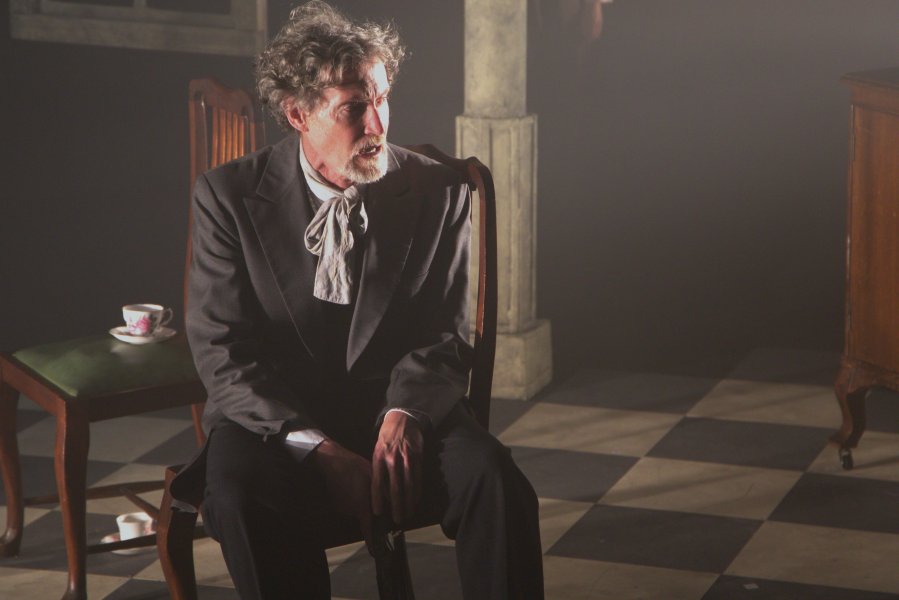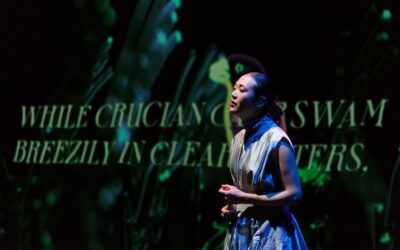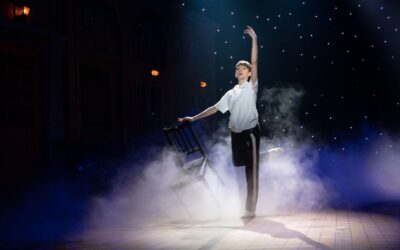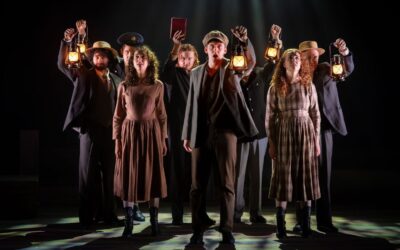By Darby Turnbull
Following their critically acclaimed and sold-out production of Ignis at last year’s Melbourne Fringe, Anthropocene Play company reunites Director Bronwen Coleman and several members of the cast to present Anton Chekhov’s Uncle Vanya at Theatreworks. Ignis excelled within the intimacy of a site specific setting and each performer presented a minimalist, hyper realistic style of acting, this production of Vanya actually performed scenes at Harewood House, and I wonder whether Coleman’s interpretation of the text would have resonated with me more effectively out of the Theatreworks space. There’s a dissonance to the presentation with melding of classicism with contemporary influences, such as indie music and some dramaturgical choices. What I was missing was a clear, committed insight into the world and relationships of the characters and their places within the household and community.
However, the space is used beautifully. Harry Gill has designed a stunning evocation of the shabby chic manor with some keenly observed set dressings and cosy mismatched furniture; the coup being a vintage samovar. Sidney Younger’s lighting beautifully brings out the textures of the set and costumes, which Gill also sourced, as well as keeping the nuances of the actors’ ‘offstage’ acting in full view.
Chekhov was, and his adaptors have upheld, a keen observer of social hierarchy and the human frailties that emerge whether they’re disrupting or upholding it. One of Coleman’s most heartfelt flourishes is to keep the cast in full view of the audience in an ‘offstage’ area where we’re allowed insight into them when they’re alone. Uncle Vanya concerns the disruptive power of tedium on a household that has hitherto run on efficient routine and the sacrifices of the Vanya and his niece Sofya in service of the absent Professor Serebyakov, a mediocre professor who has returned elderly and frail accompanied by his young wife Elena. Inserted into this motley crew is the romantic doctor, Astrov who stirs up their toxic boredom whilst inevitably succumbing to it.
Whereas Ignis presented a very cohesive and concentrated range of performances from their ensemble Vanya is a vast array with very few complimenting each other. There are several superb individual stand outs but the production suffers as an ensemble. One of my favourite theatre to film adaptations is Andre Gregory’s 1994 film Vanya on 42nd street which displays how utterly thrilling it can be when a company is so in tune to one another that they can make any interaction ring with potency and seamless emotional fluidity.
The more senior members of the company for the most part show a profound dexterity
Claire Larman as Marina or ‘Nanny’ in the great tradition of aged domestics coddles and soothes the neurotics around her and Larman imbues in her the toll decades of toil have taken on her body but its inability to do anything else but she gives tantalizing glimpses into the irritation and exhaustion at having to deal with those without a tenth of her abilities. Likewise Helen Doig as Marya, Vanya’s mother is fabulously brittle as a woman driven by social change but only participates in it through her pamphlets and bitter barbs at her son. My friend and I both agreed that our attention often wandered to these two women and how we could spend hours watching them knit, read or simply stare into the void.
Catherine Morvell as Astrov and Pia O’Meadhra as Elena both elect for minimalism. O’Meadhra as the young woman who has sacrificed her vitality for an older man who seduced her intellectually begins the play already depleted. Elena’s depressive weariness is palpable but it gives herself very few opportunities for dimension. Changing the gender of Astrov from male to female is intriguing and one I found quite exciting. Astrov is a sensualist whose romanticism inspires carnal and cerebral yearnings in Elena and her daughter in law Sofya but Morvell’s performance is so dry I couldn’t see it inspiring a grand passion no matter how hard they’re projecting onto her. The opportunities to explore how the social mobility Astrov experiences changes when the character is a woman in 1890’s Russia aren’t explored to their full potential, much less how queerness enters the narrative. Morvell and O’Meadhra don’t have enough chemistry to make their scenes together spark with complex emotion and Morvell also appears to have succumbed to the hubris of the house by the beginning so doesn’t convey the depths of a woman who is haunted by the deaths of her patients or is committed to revitalizing the land by planting trees to restore the ecosystem and emotional health of the people who live on the land. Yes, Chekhov was alluding to climate change and his adaptors have definitely felt its resonance.
Sebastian Gunner as Serbeyakov, the pompous, over indulged academic does little more than show benign entitlement and obliviousness to the feelings of those around him without showing much more that might establish him as someone whose whims cause so much casual disruption.
Alex Marshall as the perennially overlooked Sofya definitely conveys the demoralization of someone consistently overlooked, her self effacement extends to her voice which means she’s barely audible beyond the first row which doesn’t help with the limited acoustics of the space. However she inserts some wonderfully incisive elements of oddness and social awkwardness to Sofya which provide some welcome texture to her interactions. These three characters carry so much potential and I would have relished the opportunity to see these very fine performers explore their depths and contradictions with more vigorous and bold interpretations.
Dion Mills as Vanya and Callum Mackay as tenant Telegin give much more heightened, full bodied performances as befits men who have the social mobility to air their grievances but both are rooted in very grounded and emotionally detailed pathos. Mackay is younger than Telegin is usually played as the hanger on who’s vastly overstayed his welcome but there’s some defiance in the relinquishment of his own dignity and Mackay makes an absolute meal of his performative self loathing.
Dion Mills as Vanya is a tour de force and one of the main reasons to see this production. From his first ‘entrance’ he gives a fully committed physical performance- a yawn had the audience in stitches and our full engagement for the entire performance. He has such a thorough understanding of how Chekhov’s characters are both clowns and tragedians that Vanya’s may as well have been carved off to show the rawest of emotions beneath and he puts on one hell of a show with them so there’s a certain heroism in his patheticness and how the petty indignities of his existence give way to a nobility of spirit and genuine anguish at existing in a world in which he has a tenuous place.
Vanya is very much a hero for our times, someone who has sacrificed his own aspirations as futile as they may or may not be, in service of something he thought was greater but turned out to be mediocre but can still be discarded with too many years left to live. Mills has spoken about how Vanya has been a role he’s coveted and throws what seems like all of his artistic arsenal at the role in a titanic, unforgettable performance.
As always I welcome the opportunity to see fresh perspectives on enduring classics Uncle Vanya is one of those plays that stands the test of time because of how finitely it taps into the agony of mundanity of those who exist under capitalism at the expense of allowing the environment and the humans within it to flourish. Whilst my experience of this production was uneven there was so much I relished and would strongly encourage audiences to either introduce themselves or renew their perspective of Chekhov’s great tragicomedy.
Image:Mikhaela Ebony





